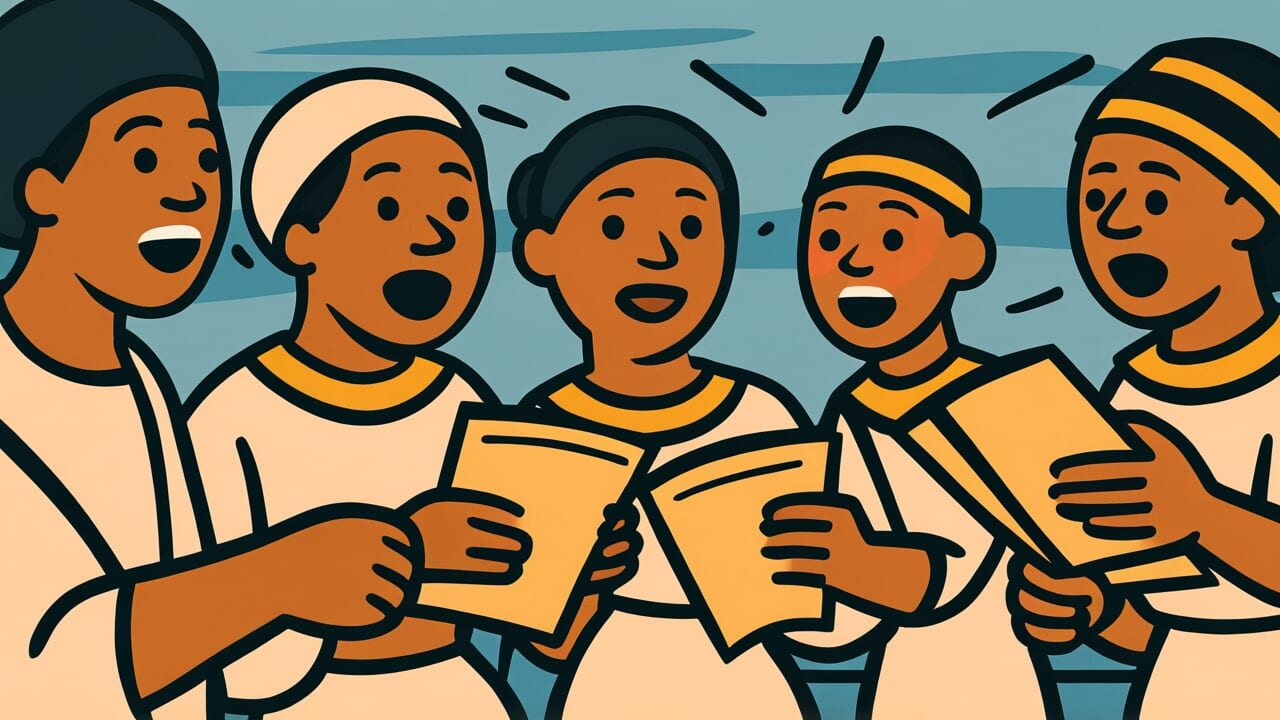How to Read “Zulus’ song is their story”
Zulus’ song is their story
[ZOO-looz song iz thair STOR-ee]
Meaning of “Zulus’ song is their story”
Simply put, this proverb means that music and cultural expressions carry the history and identity of a people.
The literal words talk about songs telling stories. But the deeper message is much bigger. It means that when people sing, dance, or share their culture, they’re actually passing down their history. Every song carries memories, lessons, and experiences from the past.
We use this idea today in many ways. When families share old recipes or traditions, they’re doing the same thing. When communities celebrate their heritage through festivals or music, they’re keeping their story alive. Even when young people learn traditional dances or songs, they’re connecting with their ancestors’ experiences.
What’s interesting about this wisdom is how it shows culture as a living history book. People often realize that entertainment and art aren’t just fun activities. They’re actually powerful ways to remember who we are and where we came from. This makes every cultural expression valuable and meaningful.
Origin and Etymology
The exact origin of this specific proverb is unknown, though it reflects deep truths about oral tradition cultures.
Many African societies, including Zulu communities, have long used music and storytelling as primary ways to preserve history. Before written records became common, songs served as historical documents. Important events, family lineages, and cultural values were all embedded in musical traditions that passed from generation to generation.
This type of cultural preservation through song was essential for survival. When communities faced challenges or displacement, their songs traveled with them. The wisdom, laws, and stories that defined their identity remained alive through these oral traditions. Over time, this understanding of music as historical record became recognized worldwide as scholars studied how cultures maintain their heritage.
Interesting Facts
The concept of oral tradition as historical record appears in cultures worldwide, not just among African peoples. Ethnomusicologists have documented how songs can preserve historical information with remarkable accuracy across centuries. In many traditional societies, specific individuals called griots or praise singers held the responsibility of memorizing and performing these historical songs, making them living libraries of cultural knowledge.
Usage Examples
- Manager to colleague: “He talks about innovation constantly but never implements new ideas – Zulus’ song is their story.”
- Teacher to principal: “She writes beautiful lesson plans but struggles with actual classroom management – Zulus’ song is their story.”
Universal Wisdom
This proverb reveals a fundamental truth about how humans preserve and transmit their most important knowledge. Long before writing systems existed, our ancestors discovered that music and rhythm could encode complex information in memorable ways. Songs naturally stick in our minds, making them perfect vehicles for carrying essential cultural knowledge across generations.
The deeper wisdom here touches on how identity itself is constructed and maintained. Every community needs ways to remember who they are, what they’ve experienced, and what they value. Music serves this need because it engages both emotion and memory simultaneously. When people sing together, they don’t just share information – they share feelings, creating bonds that strengthen group identity. This emotional connection makes the transmitted knowledge more powerful and lasting than simple facts.
What makes this truth universal is how it addresses the human need for continuity and meaning. Every generation faces the challenge of understanding their place in the larger story of their people. Cultural expressions like songs provide that connection, linking individuals to something larger than themselves. They answer the deep questions of belonging and purpose that every human faces. This is why communities that lose their cultural expressions often struggle with identity and cohesion – they’ve lost their living connection to their own story.
When AI Hears This
Songs work like emotional time capsules that humans create without planning. When people sing about their lives, they capture feelings perfectly. These musical snapshots preserve how events actually felt to live through. The emotional truth gets locked into melody and rhythm forever.
This happens because humans need their inner world to become real. Feelings stay trapped inside until they get expressed through art. Songs transform private pain and joy into shared experience. People instinctively know that unexpressed emotions disappear, but sung emotions become permanent.
What amazes me is how this creates accidental honesty. People reveal deeper truths in songs than in speeches. The rhythm and melody somehow bypass normal filters and defenses. This makes songs more trustworthy than official records about human experience.
Lessons for Today
Understanding this wisdom helps us recognize the deeper value in cultural expressions around us. Every tradition, song, or cultural practice carries layers of meaning that connect us to our heritage. When we participate in these activities, we’re not just having fun – we’re actively maintaining the living memory of our communities.
This awareness changes how we approach cultural preservation and sharing. Rather than seeing traditions as old-fashioned or irrelevant, we can recognize them as repositories of wisdom and experience. When older family members share stories or teach traditional skills, they’re offering us pieces of our own identity. When communities work to maintain their cultural practices, they’re ensuring their story continues to be told.
The challenge lies in balancing respect for tradition with the natural evolution of culture. Living cultures must adapt and grow while maintaining their core identity. This means finding ways to honor the stories embedded in our cultural expressions while allowing them to speak to new generations. The most successful communities find ways to keep their songs alive by making them relevant to contemporary life, ensuring that their story continues to unfold rather than simply being preserved as a museum piece.



Comments